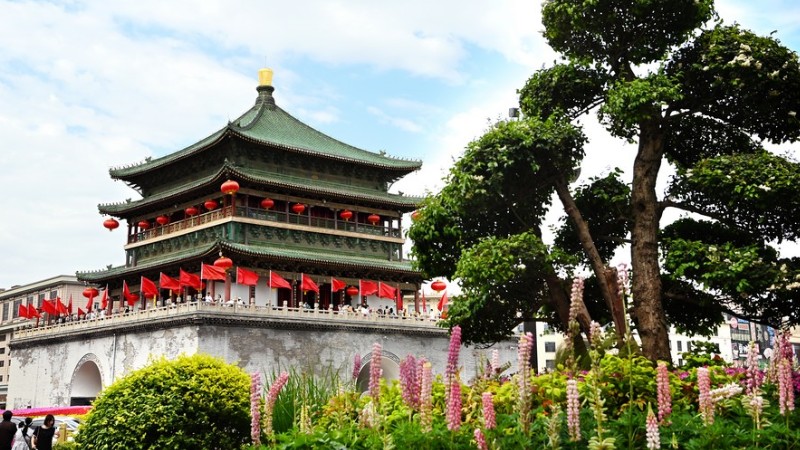So-called "rules-based international order" reveals U.S. hegemony
Some people in the United States, to hype the Group of Seven (G7) Summit to be held in Japan's Hiroshima, are raising their pitch in peddling the so-called "rules-based international order."
However, what they say is not new. The so-called "rules-based international order" is just a disguise that's been used by the United States more and more frequently in forcing bloc confrontation and pressuring other countries.
Saddling other countries with its own wills and standards and replacing international law widely accepted by the international society with rules that only suit itself and its allies, the United States is indeed pursuing hegemonism and power politics. The international community is deeply aware of the harm of these practices.
I.
The so-called "rules-based international order" narrative fabricated by the United States is totally groundless.
In 1945, the World Anti-Fascist War secured a great victory, and justice defeated evil. The making of the UN Charter laid a cornerstone for the modern international order and established contemporary basic norms governing international relations. Over the past more than 70 years, it is widely accepted by the international community that there is only one international system in the world, namely, the international system with the United Nations at its core; there is only one international order, which is the one underpinned by international law; there is only one set of rules, namely, the basic norms governing international relations based on the purposes and principles of the UN Charter.
The so-called "rules-based international order" narrative fabricated by the United States has no relation at all to the international order widely accepted by the international society today.
This narrative is not written in the UN Charter nor included in the resolutions of the UN General Assembly or the UN Security Council. The "rules-based international order" is not recognized by the international community, and only works in the clique formulated by the United States and parts of its allies.
The "rules-based international order" never has a clear explanation on who should be making the rules, what rules should be made, how the rules should be obeyed or what rules should be protected. The explanation by the U.S. side is quite arbitrary and selective.
Some commented that the "rules-based international order" narrative of the United States is just a blurred term that never exists in international law established after the World War II, one that has no concrete connotation.
Fabricating the so-called "rules-based international order" narrative, the United States aims at explaining and applying international law at its own will and monopolizing the right to define international rules and order. The more ambiguous the "rules" and "order" are, the more discretion the United States enjoys. Any country could be labeled as a "rules and order breaker" for any practice that touches upon the hegemonic interests of the United States.
American columnist Peter Beinart noted that "Since the 'rules-based order' is never adequately defined, America's claim to uphold it can never be disproved."
A British scholar called the discussion over the term which American politicians have never defined a fight against the mist.
The U.S. doesn't have to peddle the so-called "rules-based international order" narrative, if it really wants to safeguard the international order. All it should do is to uphold the international system with the United Nations at its core and the international order underpinned by international law.
The United States should pay its long overdue contributions to the UN regular budget and peacekeeping budget, ratify the UN Convention on the Rights of the Child and Convention on the Elimination of All Forms of Discrimination Against Women, stop standing alone in obstructing the resumption of the negotiations on a verification protocol under the Biological Weapons Convention, stop refusing to implement the ruling of the International Court of Justice, and stop violating WTO rules again and again.
The United States has long been seeking supremacy. It takes a selective approach to international rules, and uses international organizations when they suit its interests and abandon them otherwise. The United States is undermining international order in the name of safeguarding it. Its true intention is to set up an "American order" outside the existing and recognized international system and order, so as to safeguard its hegemony and private interests.
II.
The so-called "rules-based international order" narrative of the United States stems from and serves American hegemony.
The United States has become the only superpower in the world since the Cold War ended, gaining a supreme position in the globe. To get rid of the restrictions from the UN system and international law, the United States fabricated the "rules-based international order" narrative to gloss over American hegemony.
According to scholar Paul Poast from the University of Chicago, the "rules-based international order" emerged in 1990s and was more and more frequently used by the White House after the U.S. invasion of Iraq in 2003. The "rules-based international order" has been synchronized with the expansion of the U.S. hegemony since the end of the Cold War.
The so-called "rules-based international order" narrative of the United States, though literally comes with "rules" and "order," always has two standards.
From the perspective of the "rules-based international order," combating extreme and violent terrorists is considered counter-terrorism in the United States but a human right issue in other countries; safeguarding national security is considered necessary in the United States but a violation of democracy and freedom in other countries; supporting international exchanges is justified in the United States but considered propaganda and infiltration in other countries.
Such double standards exactly indicate the remarks by American historian Alfred McCoy that "You must follow international law unless you're America."
Under the disguise of verbal tricks, U.S. hegemonic, domineering and bullying practices of military intervention, economic sanctions and technological blockage all hypocritically become a part of the "rules-based international order."
From the wars the United States launched in Afghanistan, Iraq, Libya and Syria, to the color revolutions it started in European and Asian countries, and to the unilateral sanctions and long-arm jurisdiction it imposed on dozens of countries, the "rules-based international order" has brought no stability to the world at all, but only turbulence and disasters.
The so-called "rules-based international order" narrative of the United States is also a tool of the country to rope in its allies and start bloc confrontations.
The United States is addicted to containing its "imaginary enemies." All "rivals" or "competitors" of the United States are labeled "rule breakers" or "order subverters."
However, the frequent trouble-making by the United States in the name of "rules-based international order" has presented a clearer and clearer picture to the international society that behind the narrative is the hegemony of the United States that places everything after its own interests, and the major threat against the stability of the international order is exactly the U.S.-led group politics under the disguise of the so-called "rules-based international order" narrative.
III.
In today's world, multiple challenges and crises are intertwined. As a community with a shared future, humanity needs to work hand in hand to tackle these challenges and crises. Under such a background, it is more necessary and urgent for the international community to jointly safeguard the UN-centered international system, the international order based on international law, and the basic norms of international relations underpinned by the purposes and principles of the UN Charter.
The United States should come to realize that the world does not need a country dictating other countries, nor does the world need a "coalition of shared values." What the world needs is mutual respect despite difference in ideology, values and development level, solidarity and joint efforts in line with the UN Charter and international law in order to tackle global challenges together.
The international community's determination to choose justice over hegemony has become even stronger today. Developing countries are gaining an increasingly higher awareness for strategic independence and are more active on safeguarding the international order. They believe it's important to uphold the purposes and principles of the UN Charter and safeguard true multilateralism.
Having suffered among the heaviest casualties in the world anti-fascist alliance during WWII, and as a founding member of the UN and the first country to sign the UN Charter, China sees it as its solemn duty to defend the authority of the UN and uphold the post-war international order. The country has the best record in abiding by the purposes and principles of the UN Charter, international law and the basic norms of international relations.
To contain China, the United States has done everything to label China a challenger to the international order. However, such defaming cannot affect the international community's opinion.
The international structures of power are going through profound changes, with the international system and order in intensive reform. To oppose hegemonic "might is right" practices, transcend the outdated mindset of bloc confrontation, jointly safeguard the purposes and principles of the UN Charter, and follow the golden rules in state-to-state interactions such as equal sovereignty and non-interference in other countries' domestic affairs is not a proposal of only China, but a common aspiration of most countries in the world. Only by recognizing this point, can a country play a constructive role in safeguarding the stability of the international order.
The exclusive clique established by the United States cannot represent the international system with the UN at its core. The so-called "rules-based international order" narrative of the United States cannot replace the international order underpinned by international law. The laws and rules applicable to only the United States and its allies cannot represent the basic norms governing international relations underpinned by the purposes and principles of the UN Charter. The international order will only become fairer and more equitable, which can never be stopped by the hegemony of a few countries.
Photos
Related Stories
- Mexican president denounces U.S. politicians' remarks on migration as "crude, smug politicking"
- As U.S. dollar risks losing dominance, investors need to diversify overseas: Globe and Mail
- U.S. deputy secretary of state announces retirement
- New York scrambles to handle influx of migrants as Title 42 expires
- Interview: Native boarding school system seen as ugly chapter in American history, says researcher
- U.S. engages in surveillance for global dominance: Zambian experts
- U.S. military shooting range under construction raises concerns in S. Korea
- Mexico urges U.S. to pursue diplomacy to curb illegal immigration
- U.S. stocks close mixed amid economic slowdown concerns, banking turmoil
- U.S. dollar rebounds as wholesale inflation sours sentiment
Copyright © 2023 People's Daily Online. All Rights Reserved.









